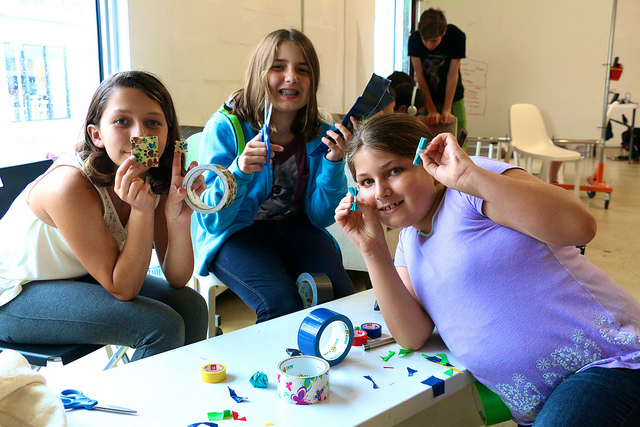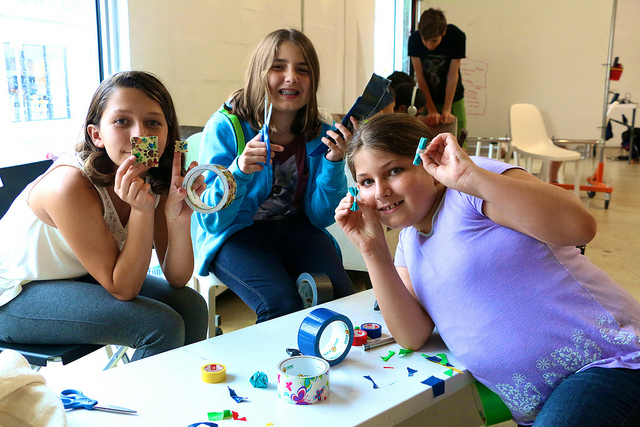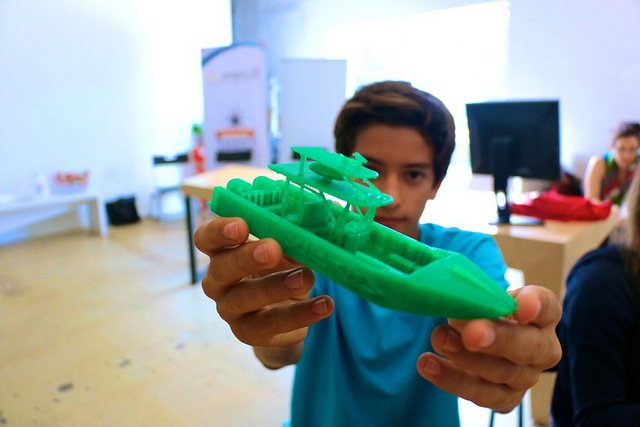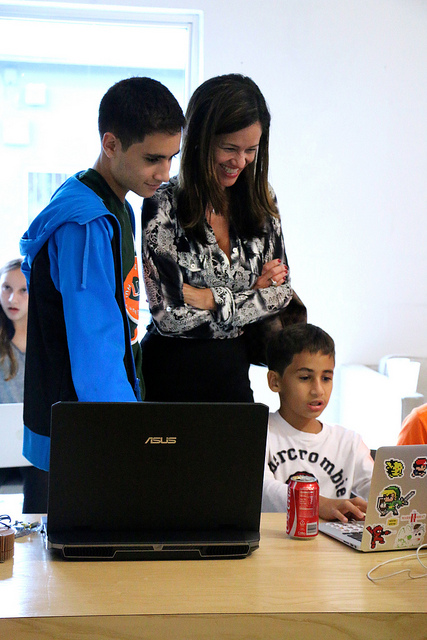
Kids become ‘makers’ at Wynwood summer camp
Above: Boys programming recorded music into a mixer. Photos by Carolina Wilson.
Wynwood Maker Camp has added a twist to the typical summer camp for kids. Children from the ages of 8 to 18 come together for two weeks, engaging with a computer science-driven and student-led curriculum.
Camper demonstrates his 3-D printed boat.
The camp, held five times this summer, is housed at The LAB Miami and hosted by MIAMade, a nonprofit working to develop a local “maker” culture, and the Maker Education Initiative, an organization that encourages youth to develop an interest in technology. Recently, Knight Foundation announced $105,000 in support for MIAMade for its 2014 Miami Makers Initiative, which includes the Wynwood Maker Camp.
Willie Avendano and Nelson Milian, entrepreneurs who met at The LAB, head the camp. With the original intention of following a regimented schedule based on basic computer-science skills, the camp has evolved into a more personalized experience based on the interests of each camper.
“One of the things we wanted to emphasize was exposure to technology,” Avendano says. “We asked, ‘What happens if we gave the kids everything we have?’ We have the knowledge and resources, and we wanted to teach them about technology. There’s no reason to have boundaries.”
Why would young children benefit from learning computer-programming skills?
“I think coding is a new tool that does a lot more than people imagine it can do,” Avendano says. “Coding is one of those very malleable, very interesting tools. It’s about how you want to use it and how you take that knowledge and apply that tool to something that’s really interesting and really beneficial to you.”
Visualization and design is also important. In addition to a team-building exercise where the children build a model of a small part of a city, camp-goers learn about 3-D modeling and printing.
“Another goal of the camp is exposure to design,” Milian says. “How do you design things that are functional, or so that it doesn’t fall? It’s important to think through and work through these types of visual problems.”
Parents and siblings visited Maker Camp for demo day.
By learning how to use and understand the Raspberry Pi, a $35 computer, the children are able to create their own devices, including a radio, camera or musical instrument, as their own personal project.
But, these personal projects have no limits. Avendano and Milian stress the importance of giving the children the resources they need to pursue any of their technological passions.
“What we learned was that self-directed projects became more important than the projects that we had already tailored for them,” Avendano says. “We would ask ourselves, ‘How do the kids find something that they’re passionate about?’ When they’re more passionate about something they’re more engaged to not only want to learn to do it, but also to create something worthwhile.”
During a recent camp, 10-year-old Abraham Coriat, for example, wanted to build a website where he could showcase his art. Coriat also expressed appreciation about the uniqueness of the camp.
“There were other camps I looked into, but they weren’t like this one,” Coriat said. “I wanted to try something new and so I came here. Usually camps are just sports camps or outside, but this one is different. You get to go inside while learning new things.”
The learning and teaching doesn’t end after the children showcase their projects to families on the last day of the session. Milian hopes the children continue to understand the relevancy and importance of obtaining knowledge about technology.
“Another goal of the camp is to prepare them for a future work force that’s going to be changing to something new,” Milian says. “It seems like invention is going to part of the new economy: inventing things, building them in 3-D, knowing how to build a website, expressing yourself, communicating and collaborating.”
What can children do in the meantime?
“I hope that this curriculum can develop into an after-school or weekend program. It can be a more project-based, student-led school where what your interest is directly translates into how you learn,” Milian says. “In the future, it’s going to be about showing the things you’ve created, being able to say ‘I did this.’”
Register your children for one of the two remaining Wynwood Maker Camps here.

Recent Content
-
Communitiesarticle ·
-
Communitiesarticle ·
-
Communitiesarticle ·




